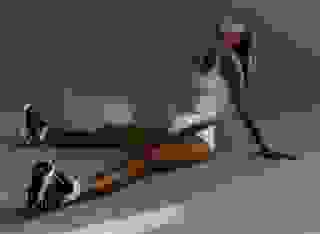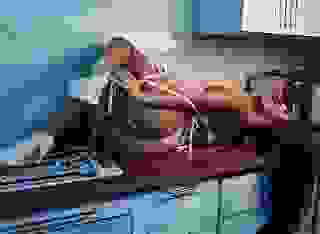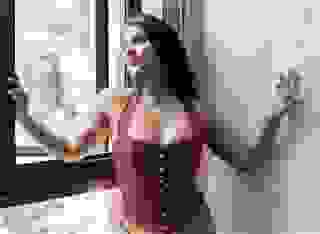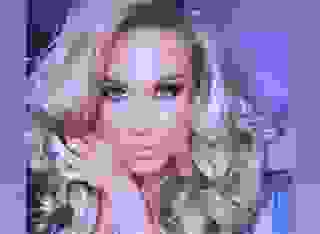- Mature
- Yes Tonight, Josephine
Note: You can change font size, font face, and turn on dark mode by clicking the "A" icon tab in the Story Info Box.
You can temporarily switch back to a Classic Literotica® experience during our ongoing public Beta testing. Please consider leaving feedback on issues you experience or suggest improvements.
Click hereIt was a while ago now, and yet I remember it as though it were yesterday.
Josephine Hyde had been a reluctant interviewee. 'What makes you think that your readers will be interested in me?' she had said when I telephoned her. 'I can understand them being interested in my paintings. But I can't see why they would be interested in me.'
'People like to know about the person behind the works,' I told her. 'I think it probably helps them to understand the works themselves.'
Josephine Hyde was not convinced.
'Have you never wanted to know more about the person behind the artwork?' I asked.
'Not really. If the painting's any good, it should speak for itself.'
'So you don't subscribe to the idea that only Picasso could paint a Picasso?'
For a moment or two she said nothing. And then she said: 'I'm not Picasso. I'm Josephine Hyde. Hyde with a Y.'
'I think the principle is the same,' I suggested.
But she didn't think that it was the same. 'Picasso was Picasso. He was a one-off.'
'And you are not?' I said.
For perhaps five minutes we batted the question back and forth, and then, eventually, she said: 'Oh well, we could try, I suppose. If I say no, you're only going to call me again in another month or so -- hoping that I won't say no a second time.'
I suggested that I would go to her studio on the following Tuesday afternoon.
'Tuesday? Hmm... I suppose that might work,' she said. 'But don't come too early. I'm getting old. I need a short afternoon nap these days.'
'Three o'clock?' I suggested.
'Three o'clock should be all right. But don't be late,' she told me. 'I hate it when people say they will come at three and then they don't show up until four-thirty.'
'I shall be ringing your doorbell at precisely three o'clock,' I assured her.
'Well, that won't be much use. I shan't hear it. The battery has been dead for a week or more now. I am sure the fellow who sold it to me said that it was supposed to recharge itself automatically. But it seems to have died. I'm afraid you will need to knock. Loudly.'
'Send me an email,' I said. 'With the battery specification. I'll bring you a new one. And, yes, I shall also knock loudly.'
Josephine Hyde didn't send me an email. But I looked up 'battery-powered doorbells' on the internet. Most of the doorbells listed seemed to use one or two of three different batteries. I purchased a small selection and slipped them into my laptop satchel.
Josephine Hyde's studio was down an alleyway in a part of the city that was beginning to enjoy a bit of a revival. It was tucked in between a motor mechanic's workshop (where they appeared to specialise in servicing classic European cars -- older Porsches, Mercedes, BMWs, Ferraris, Alfa Romeos, etcetera), and a catering equipment wholesaler. I arrived a couple of minutes before three, and waited until precisely three o'clock before rapping, loudly, on the bright yellow door.
'Hello. Tom Heisman,' I said, when she answered the door.
Josephine, who was wearing loose-fitting many-pocketed blue denim dungarees over a long-sleeved white T-shirt, looked me up and down and then glanced at the large-faced watch on her wrist. 'Well, so far so good,' she said. 'You had better come in.'
'I brought a few batteries with me,' I told her. 'Perhaps we could begin by taking a look at your silent doorbell.'
She almost smiled. 'Well, part of it is right there,' she said, pointing to the small white button. 'And the other part is just over there. Above the blue cabinet. I assume that you will be wanting tea. I shall go and put the kettle on.'
I recognised the bell set-up from one of those I had seen on the internet. There were two batteries: a lithium button battery and a 9-volt alkaline battery. I started by replacing the button battery. That made no difference whatsoever. So I replaced the 9-volt battery in the wall unit. Bingo! 'I don't think the unit is self-charging,' I said. 'You may have been misled. It looks as if you need to replace that battery from time to time.'
'Well, I certainly haven't replaced any batteries in the past four years,' she assured me. 'I'm sure I would have remembered.'
I nodded. 'Well... perhaps replace... but not very often.'
While Josephine made the tea, I studied one of the works-in-progress that was on the large studio easel. Her work was quite deceptive. From a distance, her paintings seemed to be quite loose, relaxed, almost slap dash. But, on closer inspection, it was evident that they were very carefully crafted. Each brushstroke was quite deliberate.
'The tea is Earl Grey,' she said, as she placed the tray on a small table between two chairs. 'You may have milk in it if you want to. I have some in the fridge. But I wouldn't recommend it. Not with Earl Grey.'
'No, no. Just... as it comes, thank you,' I said.
Josephine poured the tea. 'Are you going to come and sit down?' she asked. 'Or are you going to pace about like a tiger in a zoo?'
'Let me just grab a notepad,' I said.
'As a matter of interest, do you like zoos?' she asked.
'Yes. I think I do,' I confessed. 'Although I sometimes find myself feeling a little sorry for the animals. Of course, some zoos are better than others. And many zoo animals have never known anywhere other than a zoo.'
'A bit like humans,' Josephine said. 'For hundreds of years, my own ancestors lived in and around Oxford. And then, in the course of a generation or so, they were scattered to the four corners of the globe.'
'You yourself were born in India,' I said.
'Was I?'
'That's what your entry in Artist's World says. Is that not correct?'
'Probably,' she said. 'If that's what it says. I don't really remember. I was very young at the time I was born. Although I do remember going back out to India when I was four. We embarked at Tilbury and sailed to Bombay aboard the P & O steamer SS Ranchi.'
'When you were four?'
'Yes. My father had retired from active duty by then, and he went back to India to do something or other. To this day, I'm not exactly sure what. There was a good deal of drinking involved. Once or twice a week, my parents would don formal dress and go off somewhere "for drinks".' (She said 'for drinks' as though it was some sort of code for something much more.) 'Sometimes -- perhaps once a quarter -- the venue for drinks would be our villa. I remember, on one occasion, the Governor General himself was the guest of honour. At least I think it was the Governor General. It was someone important.'
'Your father was in the army.'
'Yes. He was. He was a lieutenant-colonel when he retired. He had some sort of staff role. At GHQ India. In Calcutta. But then, as I say, he retired.'
'And then he went back to India?'
'He did. We all did. By then, Father's elder brother had inherited the family estate. And his younger brother had just been made a bishop. I think Father felt more at home in India.'
'Did you go to school in India?'
'No. I had a governess. For three years. And then I went back to England where I went to Hazlehurst.'
'While your parents remained in India?'
'They came back to England each year. Until the accident.'
'The accident?'
'The train. My parents liked travelling by train. First Class of course. First Class travel was rather grand back in those days. But there was an accident. There were fatalities. There seemed to be quite a lot of train accidents in India. Quite a lot of fatalities. Or perhaps it was just that India has quite a lot of trains. Either way, my parents were killed.'
'While you were in England?'
'I think I was thirteen or fourteen at the time.'
'That must have been difficult.'
'I don't remember it being as difficult as one might imagine. My parents had almost become distant relatives by then. No pun intended.' And then Josephine's phone rang. 'I should just turn it off, shouldn't I? But then whoever it is will probably leave a message. And retrieving messages is such a palaver. Also, they might want to buy something.'
'Take it,' I said. 'I'm happy just to sip my tea.'
To give Josephine some privacy, I picked up my tea and wandered off to inspect some of the other paintings that were propped up around her studio. Yes, she certainly was a craftswoman. Viewed from up close, each mark was carefully thought out and carefully made. And yet, viewed from a little further back, her paintings had a reassuringly-relaxed quality. They seemed -- to me at least -- paintings to inspire, and yet, at the same time, paintings with which one could easily live.
'The current economic situation is affecting the art market,' Josephine said, having finished her phone call. 'Andrew, the chap at the Cooper-Taylor Gallery wants me to reduce the prices of a couple of my works. The gallerists are becoming a bit like supermarket operators. Buy one, get one free. Perhaps if they were to take a little less commission.'
'I suppose they have their expenses,' I said.
Josephine looked me up and down again, as she had when I had first arrived. 'Does your mother know that you are out?' she asked.
'My mother?'
'You're awfully young-looking.'
I laughed. 'I'm already the wrong side of thirty,' I told her.
'Thirty? A dim distant memory. Anyway... what else do you want to know?'
'Were you always interested in art?' I asked.
Josephine shook her head. 'No. Not really.'
'At school?'
'At school, I was interested in science. It wasn't until the start of my final year at Hazlehurst that I started to get interested in art. And, much to everyone's surprise, I turned out to be quite good at it. Our art teacher, Midge Wallace, suggested that I should try to get into Saint Martin's. To this day, I'm not sure how I managed. But there you are.'
'Oh? I thought that Central Saint Martins was only established in about 1990.'
'Nineteen eighty-nine, I think,' Josephine said. 'But the Saint Martin's part of CSM goes back to the middle of the nineteenth century.'
'Oh, yes. It was a merger, wasn't it? I was forgetting that. And so you became a painter?'
'Not immediately. For six years or so after graduating, I was an art teacher. At a school near Hemsley Hall.'
'Hemsley Hall?'
'My father's family estate. I lived there with my uncle and aunt for a while.'
'And did you enjoy teaching?'
'Not much. It was a bit like baby-sitting with a few art materials thrown in. But I wasn't sure what I wanted to paint at that stage. And I needed something to keep me occupied.'
'And at what stage did you know what you wanted to paint?' I asked.
Josephine frowned slightly. 'I had a few false starts,' she said. 'I think it's probably quite common. I don't think that I really found my groove -- as it were -- until I moved to Italy.'
'Italy? Was there a reason you moved to Italy?'
'A chap.'
I smiled. 'An Italian chap?'
'No, no. Huw was Welsh. But he thought the light would be better in Italy.'
I nodded. 'And was it?'
'Huw thought so. For a while, anyway. And then he thought that the light would be better in Spain.'
'And so you moved to Spain?'
Josephine shook her head. 'Huw moved to Spain. I stayed on in Italy.'
'Right.'
For a while, Josephine starred into her teacup, as though she was deep in thought. And then she said: 'Does it really matter where I did or didn't live?'
'I don't know,' I said. 'Did where you lived affect your painting? Did it influence what you painted, how you painted?'
'I think that I have always tended to paint what's in my head,' she said.
'In your head?'
'Yes.' And for perhaps half an hour we chatted about how one painting almost inevitably influences the next painting. 'But I think that has more to do with time than place,' Josephine said. And then she once again starred into her teacup. I thought that she was about to say something further about time and place, but instead she announced that she had had enough tea for one afternoon. 'I shall find us some wine,' she said. 'Does you mother permit you have the odd glass of wine?'
'As long as I don't spill it,' I told her.
Josephine nodded.
After the first glass of wine, Josephine relaxed a little and began telling me about the time that she had spent in Australia. 'I found the outback quite fascinating,' she said. 'So much space. So few people. You could travel all day without seeing another soul.'
'Did the outback landscape influence your painting?'
'I didn't make any landscape paintings. Newton did. I just kept on painting what was in my head.'
'Newton?'
'The chap I was with at the time.'
I nodded. 'Did the landscape affect what was in your head at the time?' I asked.
Josephine drained the last of the wine in her glass and starred away into the corner of the studio. 'Perhaps,' she said eventually. 'It might have influenced my colour palette.'
'Did you spend very long in Australia?'
'Actually, we were thinking about settling down there. But then Newton won a yacht. In a card game. It was pretty run down, but Newton got the idea that we should do it up and sail it to New Zealand. He said that New Zealand wasn't very far. And he said that the wind would be behind us all the way. It wasn't until we were caught in a storm, about three days out from Sydney, that Newton admitted his only previous sailing experience had been a week with a couple of school friends on the Norfolk Broads.'
'But you survived.'
Josephine laughed. 'We survived. And then we split up almost the moment that we reached dry land. My track record with chaps is not very good. We sold the boat. Newton went back to Australia. He blagged his way onto a crew delivering a boat for the start of the Sydney-Hobart race. And I went across to Hawke's Bay -- on the east coast of New Zealand -- and spent the summer picking fruit and such.'
'You didn't paint?'
'I thought about paintings. I thought quite a lot about paintings. But I didn't actually make any. Not until the following winter.'
'What happened the following winter?'
'I think it was probably just that there wasn't any fruit to pick.'
Over a second glass of wine, Josephine told me about some of her adventures in New Zealand.
'It sounds as if you quite liked New Zealand,' I said.
'Mmm... there were things I liked about it. But, god, it's a long way from anywhere.'
And then we had reached the end of our wine and I said that I should probably be thinking about going.
'Do you have enough?' she asked. 'To write your piece?'
'Well, I think I have enough to get started,' I told her. 'But we may need to talk again.'
Josephine nodded. 'We could have a curry,' she said.
'A curry?'
'Yes. Are you hungry? Or do you have a wife waiting somewhere?'
'I am rather peckish,' I said. 'And no, I don't have a wife.'
Josephine nodded. 'The curry house is rather basic, but the food is very good.'
'OK,' I said.
Josephine was not wrong. The curry house was very basic. It was situated on the edge of an industrial estate and looked as though it had, itself, once been some sort of industrial unit. The ceiling was much higher than one would normally expect for a restaurant. There was fluorescent strip lighting. And the furniture had all the chic of 1960s Formica and vinyl. But the food... the food was excellent. And Josephine knew exactly which dishes to choose.
'Are these dishes that you ate in India?' I asked.
'Too be honest, I'm not really sure. I was only seven when I left India for the second time. I just remember that the food there was generally flavoursome. However, the food at Hazlehurst was anything but.'
After we had finished eating, we chatted on for a bit and then I said that I would get the bill.
'Oh?'
'I can put it on my expenses,' I said. 'Henry is a bit of a tight arse when it comes to salaries, but he's generous enough with expenses.'
'Henry?'
'The magazine's general manager.'
'OK,' Josephine said. 'You get this. And then we can go back to mine and have a glass of Armagnac. I take it that you drink Armagnac.'
'When the opportunity presents itself,' I said
'Good. I find a glass of Armagnac quite cleansing after a curry.'
And so we went back to Josephine's studio where she produced a bottle of twelve year old Janneau XO and a couple of glasses. 'For a while, I used to know a chap whose family made Armagnac,' she said. 'He asked me to marry him. It was tempting. But not quite tempting enough.'
Josephine poured a couple of hearty sloshes and pushed one of the glasses across the table to me. 'Cin, cin,' she said.
'Cin, cin,' I echoed. Josephine was quite right about Armagnac being quite cleansing after a curry.
We chatted on for a bit, and then, almost before we realised it, our glasses were empty.
'Another splash, I think,' Josephine said. 'And then perhaps you could fuck me.'
I smiled. But then I realised that Josephine was serious.
'I take it that you do fuck women,' she said.
'I... have been known to,' I said. 'You know. Now and then.'
Josephine nodded. 'So?' she said. 'Or do you have a prohibition on fucking grannies? Not that I am technically a granny. But you know what I mean.'
'You're serious,' I said.
'Of course I'm serious. It's not everyday that I get a visit from a good-looking young man who turns up when he's supposed to turn up, knows how to fix doorbells, likes curry and Armagnac, and hopefully knows how to write a decent profile piece.'
I laughed.
'I have a proper bed up on the mezzanine,' she said. 'I am getting too old for doing it on couches and the like. We can take our drinks.' And, as far as Josephine was concerned, that was all that needed to be said. She led the way and I followed.
The mezzanine was nicely set up. 'We won't put the main lights on,' Josephine said. 'I won't make you see what you don't need to see.' And she laughed again.
Josephine was unduly harsh on herself. Yes, she was well past seventy. But she was in remarkably good shape. Had I not known better, I might have guessed that she was in her mid-50s. 'Oh, I don't know. I certainly like what I have seen so far,' I told her.
Josephine laughed again and began unbuttoning my shirt. And then she unbuckled my belt and lowered my zip. 'Gosh,' she said, as she placed her hand on the front of my boxers. 'Are you carrying a concealed weapon? Or are you just pleased to see me?'
'I guess I'm pretty pleased to see you,' I told her. 'And I should be pleased to see even more of you. Perhaps we should help you out of your dungarees.'
'You think so?'
'I do,' I told her.
'Oh, well. Your call,' she said. 'You have been warned.'
I unhooked the two shoulder straps, and the dungarees almost fell away of their own volition. 'Oh, but we'll need to remove your boots. Perhaps if you sit on the bed.'
Josephine sat on the edge of the bed and raised one leg and then the other. And then, with her boots off, we removed her dungarees completely. Beneath her dungarees she was wearing plain sage green high-cut, high-waisted knickers. I didn't mess about. As I leaned down to kiss her elegant neck, I reached down with my right had caressed her knicker-clad mons Venus. Josephine spread her thighs slightly -- as I hoped that she would.
After an indecently short time, I eased her back onto the bed.
'Before you make yourself too comfortable...,' she said, 'the top drawer of that chest over there. You'll find a white container with a leaf motif on it. Personal lubricant. It's one of the problems with getting older.'
'No problem,' I told her.
I retrieved the lube and, in the half light, tried to read the instructions. 'Does this go on me or you?' I asked.
'Probably both of us,' Josephine suggested. 'PTFE for seniors.'
'PTFE?'
'Polytetrafluoroethylene. Teflon. A substance with a friction coefficient approaching that of wet ice on wet ice.'
'Gosh, you know some long words. For an artist.'








